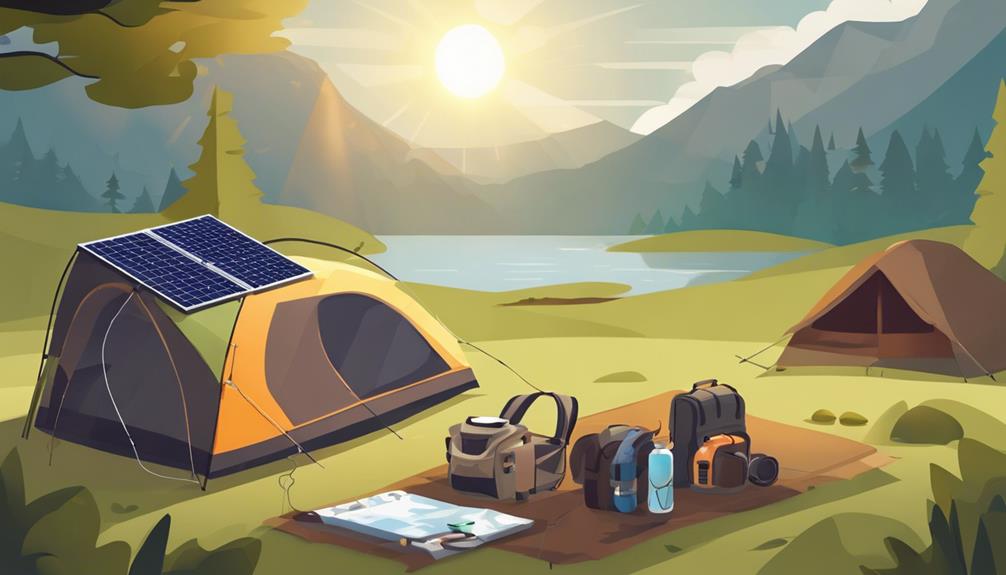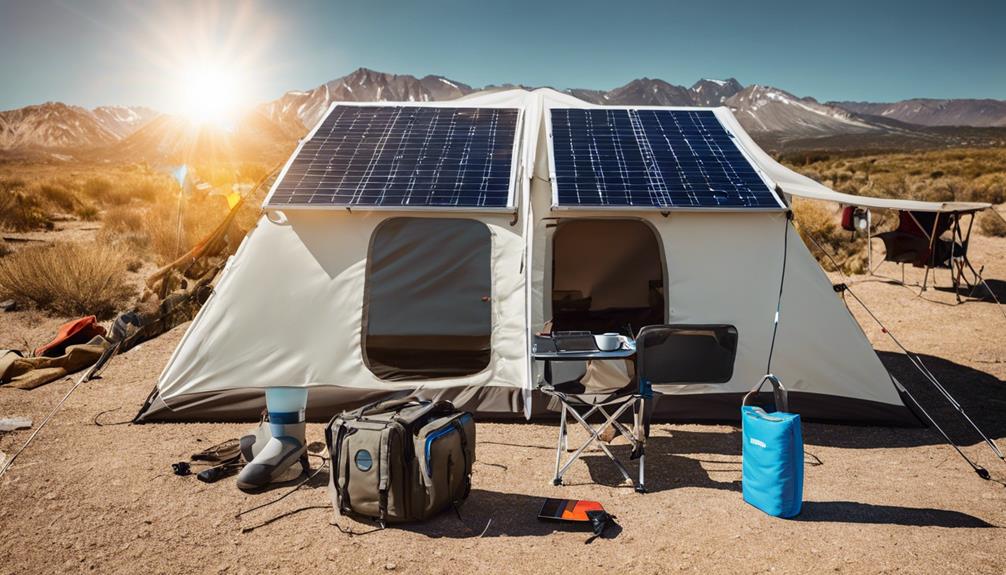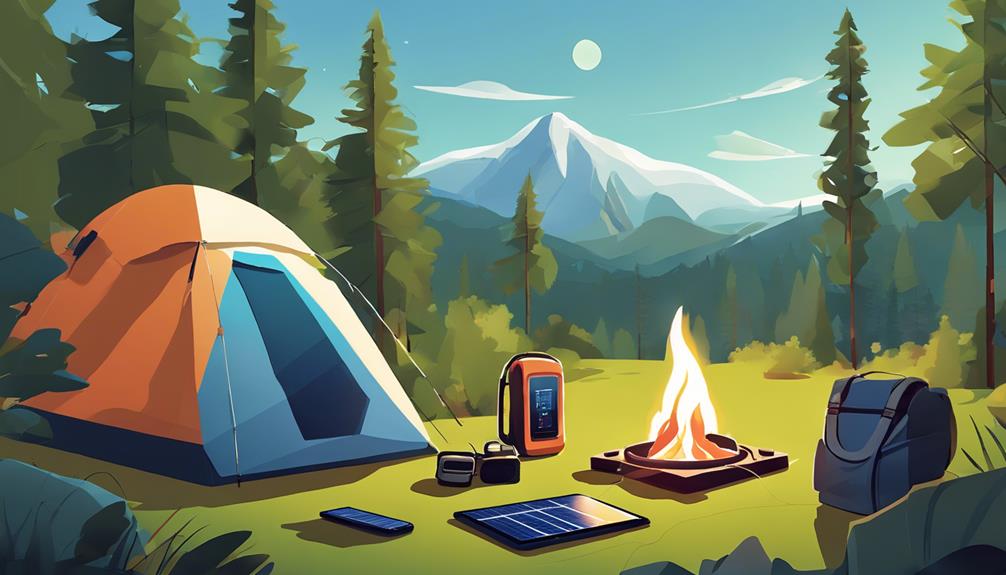When camping off-grid, you can rely on solar charging for sustainable power. Benefits include reliability, reduced environmental impact, and enhanced camping experiences. To choose the right setup, consider device compatibility, battery capacity, and optimizing sunlight exposure. Select solar panels based on wattage, efficiency, and durability. Power banks should offer high capacity, portability, and multiple charging ports. Focus on battery maintenance, device efficiency, and safety measures. With careful planning and equipment selection, solar charging while camping can make your outdoor adventures more enjoyable and eco-friendly.
Benefits of Solar Charging

Solar charging offers campers a reliable and sustainable way to power their devices while enjoying the great outdoors. This method provides off-grid convenience, allowing you to stay connected even in remote locations without access to traditional power sources. By harnessing the sun's energy, you can charge your devices without relying on electricity grids, making it an eco-friendly power solution that aligns with outdoor adventures.
One of the key benefits of solar charging while camping is the significant energy savings it offers. Instead of purchasing disposable batteries or relying on fuel-powered generators, solar charging allows you to tap into a free and renewable energy source. This not only reduces your environmental impact but also saves you money in the long run.
Furthermore, solar charging is a practical and versatile solution for campers of all levels. Whether you're a seasoned outdoor enthusiast or a beginner camper, incorporating solar power into your equipment arsenal can enhance your overall camping experience by providing a reliable and sustainable energy source.
Choosing the Right Setup
When selecting the appropriate solar charging setup for your camping needs, consider factors such as device compatibility, power output, and portability. Begin by evaluating your equipment options to make sure they align with your power requirements. Calculate the battery capacity needed based on the devices you intend to charge and the duration of your camping trip. Look for a solar charger that can deliver the required power output efficiently.
Location placement is vital for maximizing sunlight exposure. Choose a spot with minimal shade and ideal sunlight throughout the day. Position the solar panels at an angle facing the sun for better efficiency. Additionally, voltage regulation is crucial to prevent overcharging your devices. Opt for a solar charger with built-in voltage regulation to protect your electronics.
For a versatile camping setup, prioritize portability. Select lightweight and compact solar chargers that are easy to transport. Consider foldable or rollable panels for convenient storage.
Solar Panel Selection Guide

Consider key specifications like wattage, efficiency, and durability when selecting solar panels for your camping setup. Solar panel efficiency is vital as it determines how much sunlight the panel can convert into usable electricity. Look for panels with higher efficiency ratings, typically around 15-22%, to guarantee you get the most power out of limited sunlight exposure while camping.
Additionally, consider the size and weight of the panels as portable charger options that are lightweight and easy to transport are ideal for outdoor activities. Durability is also crucial, particularly for camping environments where panels may be exposed to rough handling or varying weather conditions. Opt for panels with sturdy construction and weather-resistant features to guarantee they can withstand the rigors of outdoor use.
Power Bank Essentials
To guarantee a dependable backup power source for your camping setup, it's vital to understand the essential features of power banks that align with your outdoor power needs. When selecting a power bank for your outdoor adventures, consider the capacity, portability, and charging capabilities.
Look for a power bank with a high capacity to make sure it can charge devices multiple times before needing a recharge itself. Portability is essential for camping, so opt for a compact and lightweight power bank that won't weigh you down on your excursions. Additionally, choose a power bank with multiple output ports to charge multiple devices simultaneously, catering to your charging needs during outdoor activities.
When preparing for your outdoor adventures, having a dependable power bank is crucial for keeping your devices charged and staying connected. Make sure your power bank is compatible with the devices you plan on charging and consider investing in a solar-powered power bank for extended off-grid trips.
Tips for Efficiency

Enhancing the efficiency of your power bank usage can greatly impact your camping experience by ensuring a reliable and sustainable power source for your electronic devices.
To optimize your power bank's performance, focus on battery maintenance and power consumption. Regularly check and clean the ports to prevent dust accumulation, which can affect charging efficiency. Avoid overcharging your devices, as this can reduce the battery lifespan. When charging multiple devices, consider using a power strip to minimize energy loss.
Energy conservation is key when camping. Prioritize charging essential devices first to maximize power bank usage. Adjust your device settings to lower power consumption; dimming the screen brightness and disabling unnecessary background apps can extend battery life.
Additionally, take advantage of sunlight exposure by positioning solar panels in direct sunlight for efficient charging. Regularly rotate and angle the panels towards the sun to optimize energy absorption.
Safety Measures
Implementing suitable safety measures when using solar charging equipment during camping is important to guarantee a secure and hazard-free camping experience. Emergency preparedness is vital when relying on solar power in remote locations. Always carry a fully stocked first aid kit, a flashlight, and extra batteries. Familiarize yourself with basic first aid procedures and have an emergency plan in place.
Fire prevention is another crucial aspect to keep in mind. When setting up solar panels, make sure they're placed in a clear area away from dry vegetation or flammable materials. Regularly inspect the wiring for any signs of damage and avoid overloading the system. It's advisable to have a fire extinguisher readily available at your campsite.
Additionally, be cautious of the weather conditions and take necessary precautions to protect your equipment from rain or extreme temperatures. Properly secure all cables and equipment to prevent tripping hazards.
Frequently Asked Questions
Can Solar Panels Charge Devices in Cloudy Weather?
Sure, solar panel efficiency can be affected by cloud coverage. Less sunlight reaching the panels means reduced charging capability. Cloudy weather may decrease the amount of energy generated, impacting the ability to charge devices effectively.
How Long Do Solar Panels Last in Outdoor Conditions?
Solar panels have a lifespan of 25-30 years. Their durability is influenced by factors like weather conditions and maintenance. Outdoor performance can vary, but with proper care, panels can withstand harsh environments.
Are There Portable Solar Options for Backpacking Trips?
For your backpacking trips, consider solar backpacks equipped with lightweight panels. These portable options are designed for outdoor activities, providing a convenient way to harness solar power on the go.
Can Solar Chargers Work With All Types of Devices?
Yes, solar chargers have different compatibilities with devices. It's important to check the device limitations and confirm they match the charger's power output. Understand that charging efficiency varies depending on the device and the solar charger's capabilities.
What Is the Best Way to Store Solar Panels When Not in Use?
To keep solar panel efficiency, proper storage is essential. Best storage involves keeping panels in a dry, cool place away from direct sunlight. Store them flat or upright to prevent damage and guarantee longevity.
Conclusion
To sum up, solar charging while camping offers a convenient and eco-friendly way to power your devices off the grid. By selecting the right setup, including solar panels and power banks, and following efficiency tips and safety measures, you can secure a reliable source of energy during your outdoor adventures.
With the advancements in solar technology, it has never been simpler to harness the power of the sun while enjoying the great outdoors.
